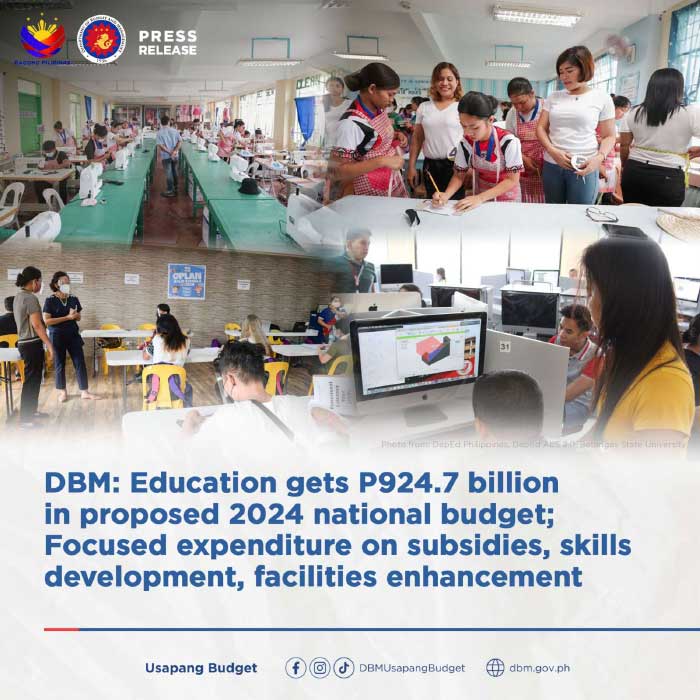
The Department of Budget and Management (DBM) set aside P924.7 billion for the education sector in the 2024 National Expenditure Program (NEP).
DBM Secretary Amenah F. Pangandaman said higher provisions for subsidies, facilities, learning materials, and skills training programs comprise the bulk of the 3.3 percent increase in the budget allocation for the education sector in the FY 2024 NEP.
DBM recently transmitted the NEP to the House of Representatives for deliberations, following its approval by President Ferdinand R. Marcos Jr.
“As mandated by the Constitution, education will remain our top priority with a total budget of P924.7 billion, equivalent to 16.0 percent of the FY 2024 NEP,” Pangandaman said.
The President recognized the amount as a crucial expenditure that will benefit students as they resume full face-to-face classes after lifting the pandemic-induced state of public health emergency in the country.
In his Budget Message, the President Marcos noted, “With 99.5 percent of our public schools now implementing 5-day in-person classes, this amount will fund significant investments in the education of over 28 million learners nationwide.”
The DBM Secretary said that of the total amount, P758.6 billion was allotted for the Department of Education (DepEd), while P31.0 billion for the Commission on Higher Education (CHED). She further revealed that P15.2 billion had been provided for the Technical Education and Skills Development Authority (TESDA) and P105.6 billion for the 116 State Universities and Colleges (SUCs), among others.
“Echoing the pronouncement of our President, alongside the strengthening of our economy, we will also invest heavily in human capital development through education, health, and social protection,” the Secretary stressed.
Subsidies for students
The subsidies consist of P51.1 billion for the UAQTE Program and an additional P41.0 billion for Education Assistance — of which P39.3 billion goes to DepEd’s Education Service Contracting, Junior High School and Senior High School (SHS) Voucher Program, and Joint Delivery Voucher Program for SHS Technical Vocational Livelihood Specialization.
Meanwhile, P1.5 billion has been allotted for CHED’s Student Financial Assistance Program and P200 million for TESDA’s Private Education Student Financial Assistance Program.
The Alternative Learning System will receive P632 million to support education, employment, and entrepreneurship programs for out-of-school youth above 15 years old who lack access to formal education.
Upgrading classrooms, facilities
The learning environment for students, including those in remote areas, will be upgraded via the Basic Education Facilities (BEF) Program, which has a P33.8 billion allocation for the construction of 7,879 new classrooms and technical vocational laboratories; repair and rehabilitation of 10,050 classrooms; procurement of 21,557 sets of school desks, furniture, and fixtures; electrification of 432 classrooms; and construction of 333 priority school health facilities, 3 medium-rise school buildings, 72 library hubs, 16 Inclusive Learning Resource Centers (ILRCs), and 4 Community Learning Centers (CLCs).
Various infrastructure projects of State Universities and Colleges (SUCs) will receive P3.4 billion.
Learning tools and equipment
As for learning materials, P12.0 billion is allotted for textbooks and instructional kits aligned with the new curriculum for Kinder and Grades 1, 4, and 7. An additional P3.9 billion will fund the procurement of learning tools and equipment, including science and mathematics equipment and technical vocational and livelihood equipment.
Further, the DepEd Computerization Program will also receive P8.9 billion to procure eLearning cart packages, laptops for teachers and non-teaching personnel, and various ICT equipment for the establishment of the MATATAG Center in 2024.
“The education budget will support DepEd’s MATATAG Agenda for Basic Education through the provision of higher allocations for textbooks and other instructional materials amounting to Php 12.04 billion,” the Budget Secretary said.
Focus on students’ nutrition
The DBM Secretary added that to improve children’s learning reception and capacity, there is a need to address nutrition.
“Furthering the cause of better nutrition for improved learning, we have also allocated Php 11.71 billion for the School- Based Feeding Program, among others,” Sec Pangandaman underscored.
Special programs for the employment of students
To equip the Filipino youth with the necessary experience for employment and offer them access to skills training in accredited institutions, the Government Internship Program will receive a budget of P808 million.
In addition, the Special Program for Employment of Students will get P829 million, and the JobStart Philippines Program, P205 million.
Further, TESDA’s Supporting Innovation in the Philippine Technical and Vocational Education Training System, will be allotted P1.8 billion to modernize the country’s technical and vocational education and training system.
The TESDA’s Training for Work Scholarship Program will receive Php 3.2 billion, while the Special Training for Employment Program and Tulong Trabaho Scholarship Program will get P1.3 billion and P1.0 billion, respectively.
Meanwhile, to tap the Bangsamore people’s potential for productive employment and skills development, the Bangsamoro Autonomous Region in Muslim Mindanao (BARMM) will also be supported through the establishment of a Professional Regulation Commission’s (PRC) field office in the region with an allotted budget of P5 million.
This will help address the needs of BARMM professionals, such as applications for initial registration of PRC licenses, PRC ID renewals, registration for professional examinations, requests for certification and authentication, and the holding of examinations.




















